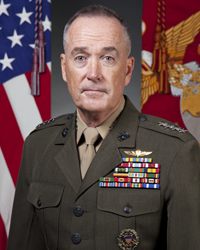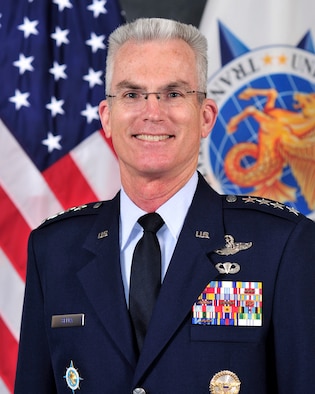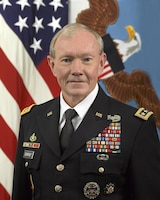Iran is among the top four state actors who pose challenges to U.S. security, according to President Obama’s nominees for chairman and vice chairman of the Joint Chiefs of Staff. “I would put the threats to this nation in the following order: Russia, China, Iran, North Korea and all of the organizations that have grown around ideology that was articulated by al Qaeda,” Obama’s nominee for vice chairman, Air Force Gen. Paul J. Selva, said at his July 14 Senate nomination hearing. Iran, the “foremost state sponsor of terrorism, is both a regional and global security threat,” Marine General Joseph F. Dunford, Jr., Obama’s nominee for chairman of the Joint Chiefs of Staff, said at his at his Senate nomination hearing.
The following is a rundown of recent remarks by U.S. military officials on Iran.
Marine General Joseph F. Dunford, Jr.
(Nominee for chairman of the Joint Chiefs of Staff)
 Question: What do you consider to be the most significant challenges you expect to face if you are confirmed?
Question: What do you consider to be the most significant challenges you expect to face if you are confirmed?The current security environment is extraordinarily complex and volatile. We face challenges from state actors including Russia, China, Iran, and North Korea.
Question: What is your assessment of the military and political threat posed by Iran?
Iran, the foremost state sponsor of terrorism, is both a regional and global security threat. Iran attempts to export its influence and protect its governing regime through support for proxy terrorist groups like Hezbollah; weapons trafficking; ballistic missile procurement and advancement; and maritime assets that threaten and harass international waters in the Straits of Hormuz and beyond.
Question: What is your assessment of the threat of Iran’s influence in Iraq to U.S. interests?
Iran’s goals and actions are inconsistent with our interests. Iran’s goal in Iraq is not to build an inclusive government; rather, it is to create a compliant, Shia-dominated buffer state.
Question: In your view, what are the risks, if any, associated with reducing U. S. presence in the Middle East with respect to the threat posed by Iran?
Reducing our presence in the Middle East could leave space for Iran to pursue its hegemonic goals. U.S. military presence gives credibility to the military options in the Middle East that both demonstrate our commitment to our regional security partners and deters Iran from employing its large conventional army or ballistic missiles and from interdicting the Strait of Hormuz. Nothing we say can match the message we deliver with our military presence or lack thereof.
Question: Negotiations on the Iran nuclear program have been extended with a deadline now of June 30, 2015 to finalize a comprehensive agreement. What are the elements of a nuclear agreement with Iran that you consider critical to ensuring that it is a “good” deal for U.S. national security interests?
A good deal rolls back Iran’s nuclear program; provides the international community with unprecedented access and transparency into Iran’s nuclear facilities and nuclear supply chain; and preserves critical sanctions on conventional arms and ballistic missiles. A finalized deal 37 based on the 02 April political framework satisfies all three of these criteria and clearly makes it more difficult for Iran to move towards a nuclear weapon.
Question: If Iran is allowed to maintain a monitored and limited uranium enrichment program, do you believe that other states in the region may seek to develop enrichment programs of their own and why or why not?
Any response I would make at this time would be speculation. If confirmed, I will make an assessment based on intelligence and my engagement with regional partners.
Question: What role, if any, should DOD play in countering Iran’s support of international terrorism?
The DoD’s role is to deter and counter Iran’s support of international terrorism and support our interagency partners’ efforts. We deter Iran through our own responsive military presence in the Middle East and through defensive infrastructure and tactics for both ourselves and our allies. To counter Iran, we enable our partner nations through counter terrorism training and equipment sales, multi-national exercises, and information sharing, which when combined help to both weaken terrorist groups and Iran’s ability to support them.
Question: Over the past few years, much has been made of the emerging anti-access and area denial capabilities of certain countries and the prospect that these capabilities may in the future limit the U.S. military’s freedom of movement and action in certain regions. Do you believe emerging anti-access and area denial capabilities are a concern?
Yes. One of the keys to our nation's success is our ability to rapidly project power around the globe. Our power projection capability is essential to deterring our adversaries and maintaining global stability. Russia, Iran, and China are developing technologies, most notably missiles, designed to limit U.S. military’s freedom of movement. If confirmed, I will make it a priority to ensure that we sustain our ability to project overwhelming combat power into any theater at a time of our choosing.
How would you respond to critics of the [U.N.] Convention [ on the Law of the Sea] who assert that accession is not in the national security interests of the United States?
There are significant national security impacts from failing to join the Convention. By remaining outside the Convention, the United States remains in scarce company with Iran, Venezuela, North Korea, and Syria, and foregoes the most effective way to counter undesirable changes in the law or to exercise international leadership. By not acceding to UNCLOS we deny ourselves the ability to challenge changes to international law as a result of the practice of nations at the local, regional, or global level. As some states seek to interpret treaty provisions in a manner that 72 restricts freedom of navigation, U.S. reliance on customary international law as the legal foundation for our military activities in the maritime becomes far more vulnerable and needlessly places our forces in a more tenuous position during operations. Moreover, by failing to join the Convention, some countries may come to doubt our commitment to act in accordance with international law.
— July 9, 2015 in testimony for his U.S. Senate Committee on Armed Services nomination hearing
Air Force Gen. Paul J. Selva
(Nominee for vice chairman of the Joint Chiefs of Staff)
 “Senator I haven’t yet had the opportunity to study the entire [nuclear] agreement, but on its face from what I’ve heard from the press, the immediate lifting of sanctions, or the sequential lifting of sanctions will give Iran the access to more economic assets with which to sponsor terrorism should they choose to do so. I think we need to be alert to that possibility…”
“Senator I haven’t yet had the opportunity to study the entire [nuclear] agreement, but on its face from what I’ve heard from the press, the immediate lifting of sanctions, or the sequential lifting of sanctions will give Iran the access to more economic assets with which to sponsor terrorism should they choose to do so. I think we need to be alert to that possibility…”— July 14, 2015, in an exchange with U.S. Sen. Mike Rounds (R-SD)
“Iran’s authoritarian regime poses both a regional and global security threat. The world’s foremost state sponsor of terrorism seeks to export its revolutionary ideology in the Middle East through a large conventional army; terrorist proxies; weapons trafficking; ballistic missile proliferation; and maritime weapons and threats to the Strait of Hormuz. Through its emergent nuclear and established cyber programs, Iran can threaten and undermine the international institutions and conventions that underpin global security. The Supreme Leader will continue to take advantage of opportunities to enable Iran’s domestic, hardline political factions’ malign policies that value regime survival over international integration.”
“Iran’s ambitions in Iraq are not to help create a sovereign, functional government. Iran wants to influence Iraq through the lens of a Shia-dominated buffer state. Currently, Iran is using its influence vis-à-vis Shia militias to offset ISIL behavior. This comes with the risk that one day these militias could possibly threaten Iraqi or U.S. forces. In the future, expect Iran to utilize its political and military instruments of power to control Iraq along sectarian lines”
“Real or perceived U.S. disengagement from the Middle East could create opportunity for Iran to increase its support to terrorist organizations. Right-sized U.S. military presence in the Middle East demonstrates not only a commitment to the region, but a commitment to our regional security partners. As a result, a continued U.S. military presence in the region will further deter Iran from conducting nefarious activities such as blocking the Strait of Hormuz or threatening other Gulf States. Finally, a continued U.S. military presence in the region is the single most important indicator of our overall commitment to a secure, peaceful and prosperous Middle East.
“From a security standpoint, important outcomes include rolling back Iran’s nuclear program providing the international community with necessary access and transparency, while preserving the sanctions imposed on conventional arms and ballistic missiles.”
“Saudi Arabia’s and other Gulf countries’ decisions on whether or not to enrich uranium are not solely tied to a deal with Iran; under the Nuclear Nonproliferation Treaty (NPT) signatories are allowed enrichment programs as part of a peaceful nuclear program. Unlike Iran, which endures sanctions, isolation, and economic distress due to a covert attempt intent on developing nuclear weapons, our Gulf partners could choose to pursue nuclear energy in compliance with the NPT. The U.S. military will continue to provide options in support of the overall U.S. strategy”
“DoD’s role is to support an interagency and regional effort to deter and counter Iran’s support of international terrorism. We deter Iran by maintaining a responsive military capability in the region and ensuring a robust defensive infrastructure for ourselves and our allies. To counter Iran, we work by, with, and through partner nations by conducting counter terrorism training, providing equipment sales, participating in multi-national exercises, and sharing information. When combined, these efforts—along with those of our partners—help to weaken terrorist groups and hinder Iran’s ability to support them.”
“Iran maintains a layered A2AD capability through the employment of road mobile ballistic missiles, an integrated air defense system, anti-ship cruise missiles, and naval assets stationed in the Persian Gulf.”
— July 14, 2015 in answers to advance questions from the Senate Armed Services Committee for his nomination hearing
“I would put the threats to this nation in the following order: Russia, China, Iran, North Korea and all of the organizations that have grown around ideology that was articulated by al Qaeda.”
“The sequential lifting of sanctions will give Iran the access to more economic assets with which to sponsor state terrorism should they chose to do so.”
“I think we need to be alert to that possibility, and, as the military, we have an obligation to provide the president with a full range of options to respond.”
— July 14, 2015 at his Senate Armed Services Committee hearing according to the press and Department of Defense
Commander of Army Forces Command Gen. Mark A. Milley
(Nominee for Army Chief of Staff)
 “Russia, China, North Korea, Iran, ISIS and radical violent extremist organizations currently challenge the U.S. each in their own way and will likely continue for some time into the future.”
“Russia, China, North Korea, Iran, ISIS and radical violent extremist organizations currently challenge the U.S. each in their own way and will likely continue for some time into the future.”“The 2012 Defense Strategic Guidance was based upon a number of assumptions, such as the duration of conflicts, the contributions of our allies, and the nature and location of future threats. Some of these assumptions now appear optimistic, particularly in light of the rise of ISIL, a resurgent Russia, Iran’s actions in the Middle East, and challenges in the Pacific region. If confirmed, I will provide my best military advice to inform policy and guidance as we move forward to confront current and future threats.”
— July 21, 2015 in his Senate confirmation hearing
Secretary of Defense Ashton Carter
 “The basic facts have not changed recently. That is, we continue to have the tools to do that (set back, destroy Iran’s nuclear program) and continue to maintain the military option, because the president has instructed us to, because his determination is that Iran not have a nuclear weapon, and that - while he’s obviously - and Secretary Kerry is working on this right now, looking to get a deal - a- no deal is better than a good deal (sic). And therefore, we are under instructions and have been - you’re right - for years to do that.”
“The basic facts have not changed recently. That is, we continue to have the tools to do that (set back, destroy Iran’s nuclear program) and continue to maintain the military option, because the president has instructed us to, because his determination is that Iran not have a nuclear weapon, and that - while he’s obviously - and Secretary Kerry is working on this right now, looking to get a deal - a- no deal is better than a good deal (sic). And therefore, we are under instructions and have been - you’re right - for years to do that.”“And the facts are as you say. Namely, it sets back an Iranian nuclear program. But obviously anything like that can be reconstituted over time. And so a military strike of that kind is a setback, but it doesn't prevent the reconstitution over time. And that's the -- that basically has been the case as long as we've had those instruments and those plans, and I don't think there's anything substantially changed since then.”
— July 1, 2015, in a Department of Defense Press Briefing
“We have serious concerns with Iranian malign activities outside of the nuclear issue,”
“We want them to continue to be isolated as a military and limited in terms of the kind of equipment and material they possess.”
— July 8, 2015, according to press
Joint Chiefs Chairman Gen. Martin Dempsey
 “Just -- the assumption sounds like it's that we would only do that once. I mean, the military option [for dealing with Iran’s nuclear program] isn't used once and set aside. I mean, it's -- it remains in place. And so we will always have military options, and a massive ordnance penetrator [also known as a bunker buster bomb] is just one of them.”
“Just -- the assumption sounds like it's that we would only do that once. I mean, the military option [for dealing with Iran’s nuclear program] isn't used once and set aside. I mean, it's -- it remains in place. And so we will always have military options, and a massive ordnance penetrator [also known as a bunker buster bomb] is just one of them.”— July 1, 2015, in a Department of Defense Press Briefing
"If there's a deal, I've got work to do with them [U.S. regional allies]. And if there's not a deal, I've got work to do with them."
"We're committed to doing that work."
— June 30, 2015 according to press
